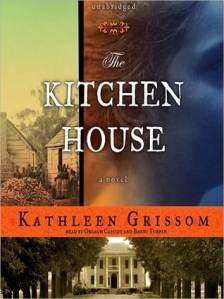****½
The Kitchen House
 Author: Kathleen Grissom
Author: Kathleen Grissom
First Edition: 2010
Original language: English
Awards:
- Goodreads Choice Award Nominee for Historical Fiction, Debut Author (2010)
Summary:
Told from the point of view of an orphaned Irish indentured servant and the illegitimate daughter of a tobacco plantation owner and one of his slaves, The Kitchen House tells the story of slavery in the US through unconventional, female eyes. Lavinia’s parents die on the crossing from Ireland and she is thrown into the kitchen house and the family of slaves that serves the white family in the big house. Belle runs the kitchen house, cooking the meals for the captain, his wife and their children. What the captain’s family doesn’t know is that Belle is his daughter.
As she grows up, Lavinia becomes accepted into white society and is forced to leave her family in the kitchen house. In her haste to return to a life that she can never have again, Lavinia makes a series of decisions that will have world-altering consequences for everyone connected to the plantation.
Quotes:
“A brilliant sunrise in a cloudless sky threw gold on our small world.”
“What the color is, who the daddy be, who the mama is don’t mean nothin’. We family, carin’ for each other. Family make us strong in times of trouble. We all stick together, help each other out. That the real meanin’ of family. When you grow up, you take that family feelin’ with you.”
“Sometimes we got to live it out before we learn.”
Opinion:
Kathleen Grissom says she wrote the novel after she and her husband restored a plantation tavern in Virginia. The story came to her as she researched the history of the place and as she lived there and felt the energy of the place. I love it when authors let us in to where there stories and ideas come from…
This book was a wonderful read- the kind of book you want to read slowly to make it last, but can’t resist reading as fast as possible. “Ok, just one more chapter…”
Neither Lavonia nor Belle fit into the southern society of the times and from their unique vantage point, they speak to certain aspects of slavery and southern society in a different and insightful way. Both are women that have a change of leaving their subservient positions in life, but neither want to. Ultimately this choice is their undoing. In this way, Belle views the captain’s giving her her freedom papers as a way of kicking her out- something that other slaves could only dream about. Lavinia views sitting up front in church and ultimately her move away from Tall Oaks in much the same way.
The relationships between men and women were also treated in an interesting way, as Grissom explores rape, incest, love, companionship and friendship through the characters in the book and the way they interact with each other.
Perhaps the most poignant part of the book is Mama Mae’s view of life, reflecting the only way life could be endured in a situation of slavery and bondage: “You look at today, chil’. You say, ‘Thank you, Lawd, for everythin’ you gives me today.’ Then you worries about the next day when the next day come.”
